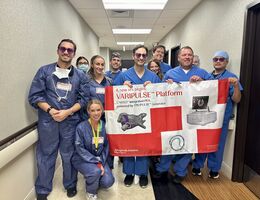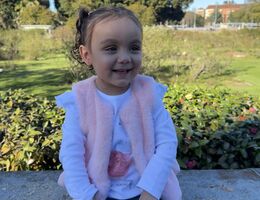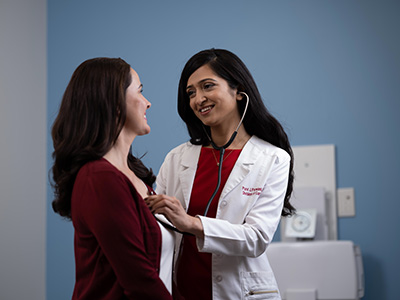
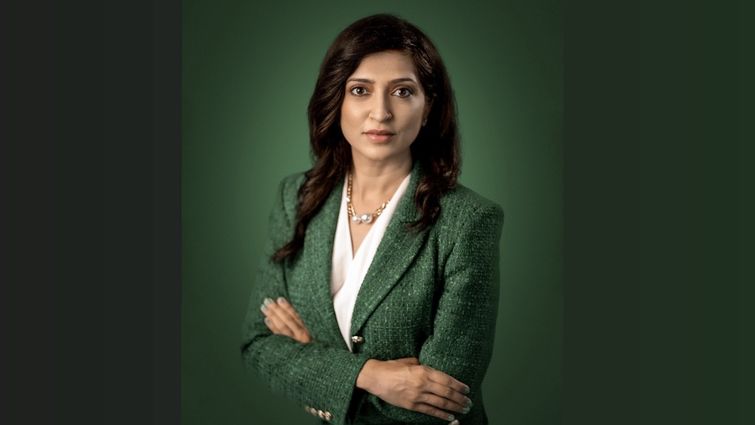
Photo by Chet Williams
This story first appeared in Scope magazine.
Throughout her cardiology fellowship, Purvi Parwani, MD, MBBS, MPH, looked on as female patients checked into the emergency department with heart attack symptoms, watching as medical teams ordered tests to investigate causes and evidence behind the women’s heart attacks. She then watched women whose tests had turned up “normal” return home without confirmation of having had a heart attack, proper treatment, or further guidance.
“There was not much understanding of women’s cardiovascular disease and these new disease phenotypes at the time,” Parwani recalls. She now believes many of those women suffered from MINOCA (myocardial infarction with nonobstructive coronary arteries), a condition five times more likely to occur in women. MINOCA is characterized by heart attacks that aren’t caused by blocked arteries. In other words, testing MINOCA through coronary angiogram doesn’t often reveal traditional traces of a heart attack. Until recently, such results were grounds for patient dismissal.
Read: Patient finally finds answers, treatment at Women’s Heart Health Clinic
As a young fellow reflecting on the patients sent home without due resolutions, Parwani developed a conviction: to be good at clinical cardiology, she’d need to know how to piece together the puzzle of these too-common diagnostic dilemmas; she'd need to know how to perform and interpret cardiac imaging to draw conclusions herself.
“I couldn’t rely on anyone else,” says Parwani, who proceeded to complete a fellowship in advanced cardiovascular imaging. “Rather than accept other cardiologists’ or specialists’ reports of a patient’s tests at face value, I had to make sure I could put the entire picture together myself."
At the turn of the century, the medical community had barely begun unpacking fundamental differences in women’s and men’s cardiovascular physiologies. Efforts to better understand women’s cardiovascular health have since expanded multi-fold, ushered forth by cardiologists like Parwani, who spearheads such initiatives as director of the Women’s Heart Health Clinic at Loma Linda University International Heart Institute.
I was so immersed that I left everything else behind.Dr. Purvi Parwani
An earlier personal encounter with an abnormal electrocardiogram (EKG) during her second year of medical school in Ahmedabad, India, had drawn Parwani to cardiology in the first place. She lay still on the exam table, hyper-aware of her heart's rhythm as it beat against sticky chest patch monitors — suction cups on the ends of wiry tentacles tracing back to an EKG machine.
Test results granted Parwani far more than an assurance that her palpitations and so-called abnormal EKG weren’t cause for concern — they placed her on a new path. That same week, she borrowed a 400-page textbook about cardiac physiology from the school library, conquering its contents in 48 hours.
“I was so immersed that I left everything else behind,” she recalls, fascinated by the physiology of the heart. Though brimming with insights, the book made no mention of differences in men’s and women’s cardiovascular systems, diseases, presentations, or risk factors.

It wasn’t until after Parwani earned her certification in cardiac imaging years later that whispers about women’s cardiovascular disease at cardiology conferences steadily snowballed into a buzz.
“Many thought leaders in the field began talking more about women’s cardiovascular disease, the diagnoses for which relied on the non-invasive imaging techniques I had just mastered,” she says. “There was so much to be discovered in this new field that was just emerging, and I realized that if there has to be a clinical interest of mine, it ought to be that.”
Recent, groundbreaking findings of fundamental differences in men's and women's physiology and hormones help explain gender differences in cardiovascular health risk factors and disease presentations, Parwani says. Besides universal risk factors for cardiovascular disease — including obesity, smoking, diabetes, high blood pressure, family history, and metabolic syndrome — some risk factors are particular to women.
Risk factors unique to women encompass pregnancy-related factors such as developing diabetes, eclampsia or pre-eclampsia, premature birth, placenta, or vascular issues. Menopause is another risk factor for cardiovascular disease in women as levels of estrogen that once formed protective lining within blood vessels begin to dissipate. Women also are disproportionately affected by inflammatory and autoimmune disorders such as lupus, rheumatoid arthritis, and scleroderma, which are associated with an increased risk of heart inflammation, heart and valve disease, and heart attacks.
Physicians are also beginning to suspect that cardiovascular conditions commonly seen in women and rarely in men — vasospastic angina and broken heart syndrome — are tied to stress and depression amongst other differences between the genders.
Both men and women can present in emergency departments for ischemic heart disease with classic chest pain symptoms, Parwani says. Still, studies show these women are disregarded more often than men because their symptoms are judged to be psychosomatic. Women can also present with other symptoms less commonly experienced by men, including exclusive shortness of breath, right-sided chest pain, shoulder pain, or jaw pain.
“I tell my patients that when they feel things aren't right, even if they don’t have classic chest pain, come to the emergency department and let us figure it out,” Parwani says. “I also advise them to make sure they directly ask whoever is taking care of them before they leave, ‘Are you sure I am not having a heart attack?’”
Read: COVID-19’s impact on women’s cardiovascular health
Part of what allows Parwani to do right by her patients is to forge strong bonds with each person, she says, to understand their backgrounds and meet them where they are. Parwani attributes part of her ability to connect with individual patients to her physician father’s practice and humble roots.
Growing up in a small town in India, young Parwani tagged along on her father’s rounds, soaking in the exchange of generous gestures between him and patients. One weekend of Diwali, a major festival of lights, an awe-struck six-year-old Parwani accompanied her father as he left Puja, a prayer time, to treat a beggar’s child who had been burnt by firecrackers.
“We knew when the patient walked in they didn’t have any money to pay for the service, but my father graciously obliged,” Parwani said. “He explained to me that this was a big day for us, but also them. The way the patient gave blessings to our entire family still sticks with me. After that, I knew if I ever wanted to grow up and do something, I’d want to be the kind of doctor to take the pain away from my patients and be a true healer.”
Read: Patient is grateful for heart specialist’s pulse on women’s heart health
Parwani said her early encounters with healthcare also afforded her an appreciation for the social determinants of health and their impact on cardiovascular disease. She said she strives to first learn about each patient’s background, stressors, income level, family situation, and profession before working with them to find realistic, attainable lifestyle modifications to improve their heart health.
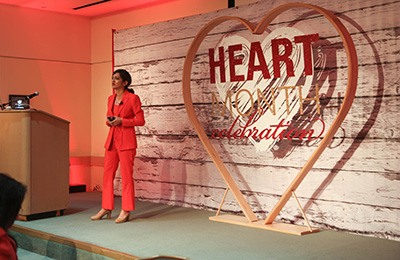
"Just telling patients to eat healthily and exercise does not suffice," Parwani said. “Everyone has a complex story behind them. It is important to understand that story and make our patients feel we are amongst them, because we are.”
Working with the Inland Empire’s diverse patient population, Parwani said she aims to continue the never-ending feat of further understanding women’s cardiovascular disease. She also said she hopes to expand cardiology services multi-fold, providing a robust range of diagnostic and treatment options to women across the region. So far, fruitful and fulfilling patient interactions have fueled and re-fueled Parwani’s passion for her specialty.
“It all traces back to what I stepped into this field for, after spending hours on rounds with my father,” she says. “Being the recipient of patients’ gratefulness, love, and blessings makes my job the most fulfilling task I can ever do in my life.”
Meet Our Providers
Purvi Parwani
Director of Women's Heart Health Clinic
Specialties: Cardiovascular Disease, Cardiac Imaging
Learn more about this provider

